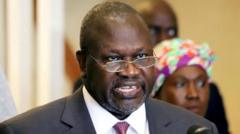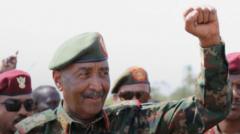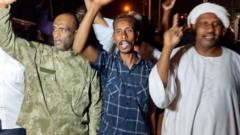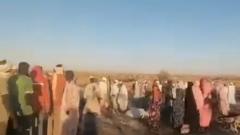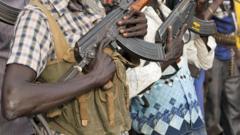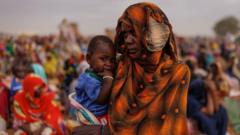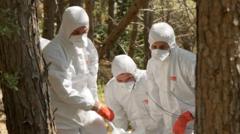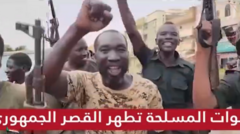While the Sudanese Armed Forces have reclaimed significant ground in Khartoum, the situation remains precarious with the potential for prolonged conflict and humanitarian crises.**
Sudan's Army Reclaims Presidential Palace: A Turning Point or Ongoing Strife?**
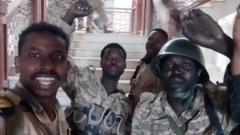
Sudan's Army Reclaims Presidential Palace: A Turning Point or Ongoing Strife?**
The recapture of the presidential palace by Sudan's army heralds a notable military victory but questions remain about its impact on the ongoing civil war.**
Sudanese soldiers celebrated a major achievement as the army successfully retook the presidential palace, marking a pivotal moment in their two-year struggle against the paramilitary Rapid Support Forces (RSF). This recovery of power in Khartoum represents a strategic shift in the military’s campaign to regain control of the capital, which they lost early in the conflict.
The palace is a powerful symbol of authority and governance for the military-led administration, which has framed its battle against the RSF as a fight against terrorism. According to military officials, the army has reclaimed a significant portion of the city, pushing RSF fighters away from critical government buildings and closer to the outskirts. Despite this progress, the situation is not yet resolved, as RSF fighters continue to strategically hold areas in Khartoum, including parts of the airport.
The ongoing battle poses questions about the future dynamics of the conflict as fierce clashes are expected as the army attempts to completely dislodge the RSF. In a display of resilience, the RSF has conducted counterattacks, including a recent drone strike that targeted the presidential palace, resulting in casualties among journalists and army personnel.
Control of Khartoum could enable the army to extend its influence in central Sudan, especially against RSF strongholds in Darfur. While some see the potential for a decisive military victory, analysts warn of the risks of Sudan descending into a state of de facto partition, as both factions pursue control over their respective territories. The RSF’s establishment of a parallel government in controlled regions signals that despite setbacks, it remains an active player seeking national influence.
The toll of this civil war on civilians has been catastrophic, leading to extensive human rights violations. The United Nations has characterized Sudan as facing the world’s most severe humanitarian crisis, with millions displaced and regions, including Khartoum, on the brink of famine as a result of violence and aid restrictions.
Although the recapture of the presidential palace might suggest a change in fortunes for the Sudanese Armed Forces, experts remain skeptical of any profound change in the overall situation for the Sudanese people. Both factions are accused of employing aid as a weapon against civilians, with widespread allegations of war crimes emerging from the conflict. As military operations continue, the future trajectory of peace talks remains uncertain, leaving many citizens to face an enduring cycle of violence and instability.
The palace is a powerful symbol of authority and governance for the military-led administration, which has framed its battle against the RSF as a fight against terrorism. According to military officials, the army has reclaimed a significant portion of the city, pushing RSF fighters away from critical government buildings and closer to the outskirts. Despite this progress, the situation is not yet resolved, as RSF fighters continue to strategically hold areas in Khartoum, including parts of the airport.
The ongoing battle poses questions about the future dynamics of the conflict as fierce clashes are expected as the army attempts to completely dislodge the RSF. In a display of resilience, the RSF has conducted counterattacks, including a recent drone strike that targeted the presidential palace, resulting in casualties among journalists and army personnel.
Control of Khartoum could enable the army to extend its influence in central Sudan, especially against RSF strongholds in Darfur. While some see the potential for a decisive military victory, analysts warn of the risks of Sudan descending into a state of de facto partition, as both factions pursue control over their respective territories. The RSF’s establishment of a parallel government in controlled regions signals that despite setbacks, it remains an active player seeking national influence.
The toll of this civil war on civilians has been catastrophic, leading to extensive human rights violations. The United Nations has characterized Sudan as facing the world’s most severe humanitarian crisis, with millions displaced and regions, including Khartoum, on the brink of famine as a result of violence and aid restrictions.
Although the recapture of the presidential palace might suggest a change in fortunes for the Sudanese Armed Forces, experts remain skeptical of any profound change in the overall situation for the Sudanese people. Both factions are accused of employing aid as a weapon against civilians, with widespread allegations of war crimes emerging from the conflict. As military operations continue, the future trajectory of peace talks remains uncertain, leaving many citizens to face an enduring cycle of violence and instability.


